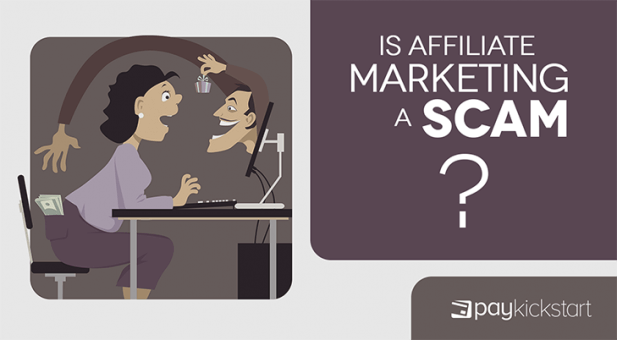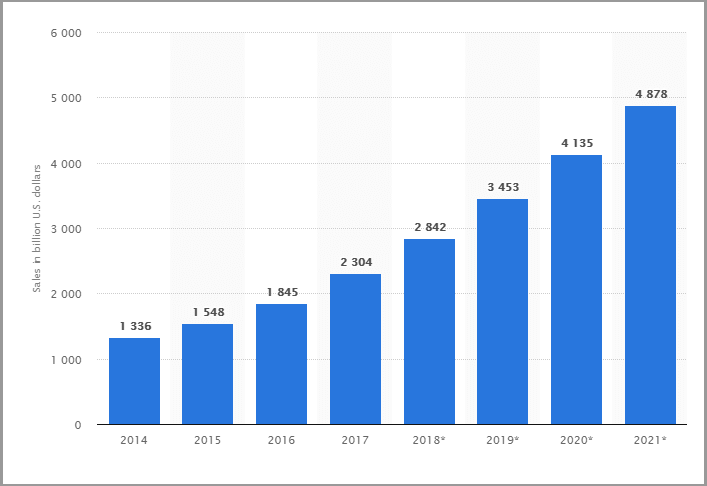Subscription growth hack (by PayKickstart)
Facebook Group - 3,932 members
Visit Group
In 2018, it’s estimated that 2.84 trillion dollars in transactions were performed online. That number is expected to almost double by 2021.

According to BI Intelligence, affiliate marketing makes up 15% of all revenue in the digital media industry. That’s equal to billions of dollars.
I have a question, if affiliate marketing was a scam, do you think it would have grown to be a multibillion dollar industry and employ tens of thousands of people around the globe? Also, do you think it would’ve lasted as long as it has?
The short answer is no. Affiliate marketing is not a scam.
Even though it’s not a scam, affiliate marketing has a lot of grey areas that should be navigated with care. In this article, I’ll look at what legitimate affiliate marketing is and how to identify scams to protect your business.
Affiliate marketing is the process of promoting the products of other companies and earning a commission for successful sales. Affiliates send visitors to your website, those visitors click around and buy something, and you send a cut of the sale amount to your affiliate.
It’s one of the simplest business models in existence because affiliates aren’t responsible for conversions or fulfillment. If your funnel isn’t properly set up and the traffic affiliates send you isn’t converting, they’ll find another vendor.
Put all the assets you need in place to attract and retain affiliates and you’ll be happy you got started with an affiliate marketing program.
Affiliate marketing is legitimate and is a multibillion dollar industry. We’ve established that. Unfortunately, there are still scams you and your affiliates should be aware of.
This type of scam preys on the online business newbie who doesn’t know their left from their right. An affiliate marketer will come from nowhere and create a sales page with formulaic headlines with huge red text that promise the world.
A headline may sound like this:
“Earn hundreds of thousands from affiliate marketing, quit your job, and travel the world.
Even if you’ve never sold anything in your life.”
“Work from home”
“Make money while you’re sleeping”
They use paid ads to drive traffic to their websites, milk it for all it’s worth, and give out information you can find with a simple Google search.
People who buy the program learn little and don’t make money. It’s natural for them to think it’s a scam.
Not all affiliate marketing courses are scams. There are great ones out there. The bad eggs get just enough people for the affiliate marketing scam to persist.
This one is simple, do your research. If it sounds too good to be true then it probably is. When you come across a program you’ve never heard of, take a few minutes to do a Google search on the person that’s selling it.
These aren’t foolproof but will go a long way towards helping you identify poor products.
This is also known as click fraud. It’s one of the most common types of affiliate marketing scams and is also simple to perform when promoting click based or lead based affiliate marketing.
Affiliates will send bot traffic to click on links or sign up and they earn the commission. The referrals they send will never convert because they’re not real people. This type of scam drains funds and doesn’t yield any ROI.
There are two major ways to cut down on this type of affiliate fraud.
The first one is to stop paying out commissions for traffic or leads. This solution may or may not work for your business depending on what you sell and what your sales cycle is like.
For example, if you’re selling six figure software and the sales cycle is long then commissions on sales may not appeal to affiliates because they take so long.
Conversely, you can use a system with built in protections to prevent fraudulent actions. PayKickstart allows you to pay out commissions on leads and has fraud detection to protect you and your hard earned cash.
Credit card fraud is a real issue anyone doing business online has to face. It’s doubly important with affiliate marketing.
An affiliate performs transactions on your website after clicking on their affiliate link. It goes through in the short term and you pay them a commission. After a while, the real card owner realizes what happened and asks for a refund or initiates a chargeback.
You’re then forced to refund the money, pay the chargeback fees, and are out the commission paid to the affiliate. It can cost you a lot of money in a short amount of time.
We’ve already covered the major ways to protect yourself from credit card fraud in this article. I’d like to also highlight ways to approach it specifically with affiliate marketing.
Monitor newer affiliates closely. When you sign up new affiliates, limit the products they can promote until you’ve seen their performance. If you have less expensive products then start them on those and only unlock high ticket products when you’re comfortable with them.
Set longer payout timeframes. It may be tempting to pay affiliates more quickly to make your program attractive. This also increases the risk of paying commissions on fraudulent transactions.
Chargebacks from legitimate customers usually occur within 45-60 days if at all. To protect yourself, add a blanket rule that you don’t pay commissions until 60 days after the initial transaction. This will discourage a lot of affiliates who’re planning on using credit card fraud.
Affiliate marketing is not a scam. At times, it’s poorly understood. Before you get started, understand what’s normal and what a red flag is.
As an affiliate marketer, steer clear of courses with outlandish promises, programs that require payment, and no product to sell.
As a business recruiting affiliates, be aware of fake clicks and referrals as well as credit card scams.
I’ve not covered all the ways people attempt to use affiliate marketing for nefarious purposes because they’re always coming up with new tactics.
To protect yourself, stay on top of the latest news and follow best practices.
Let me know what you think about affiliate marketing scams in the comments and don’t forget to share.
Daniel Ndukwu is a regular contributor to the PayKickstart blog. He has extensive experience with online businesses, conversion optimization, and subscription revenue models. When he's not writing insightful content, he works with other entrepreneurs to help them grow their bottom line.
Read More About Daniel Ndukwu